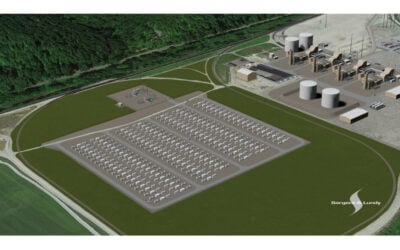UK energy and climate secretary Amber Rudd has spoken of her excitement of the “fantastic opportunity” posed by combining energy storage solutions with solar PV.
Rudd was giving evidence to the Energy and Climate Change Select Committee at the Houses of Parliament yesterday, advising it on the department’s priorities for the year ahead and what might shape policy decisions in the coming months.
Enjoy 12 months of exclusive analysis
- Regular insight and analysis of the industry’s biggest developments
- In-depth interviews with the industry’s leading figures
- Annual digital subscription to the PV Tech Power journal
- Discounts on Solar Media’s portfolio of events, in-person and virtual
Her appearance before the committee came amid increasing uncertainty in the UK renewables sector. The Levy Control Framework (LCF) - the mechanism which controls the costs of renewable energy levies that are passed onto consumers - looks set to record a substantial overspend and persistent rumours hinting towards cuts to solar subsidies were proven to be true this morning when the Department of Energy and Climate Change (DECC) launched two consultations on revisions to its Renewables Obligations and feed-in tariff support schemes.
The secretary however referenced storage throughout the proceedings and heralded it as a “really excitement” development for the energy industry, particularly when combined with solar generation, and said the “huge expectations” of the technology represented a “fantastic opportunity” for it in the UK.
And her sentiments were echoed by Department for Energy and Climate Change permanent secretary Stephen Lovegrove, also giving evidence, who said: “until we get storage right, renewables are unreliable".
But while both Rudd and Lovegrove were quick to talk up storage’s potential in the UK, they could not be pressed into committing subsidy support to it under the Levy Control Framework due to its overspend, the extent of which Rudd revealed this week to be in the region of £1.5 billion (US$2.3 billion).
The industry has suggested in the past that subsidising storage technology under the LCF umbrella could help stimulate investment in the nascent technology but while Rudd proposed a closer collaboration between DECC and the Department for Business, Innovation and Skills (BIS) in order to help develop the technology, there has yet to be any suggestion that it could be subsidised in the near future.
Anthony Price, Electricity Storage Network director, said storage is in need of a “more joined up government approach” if it is to take off in the UK. “DECC, BIS, DETI (the Department of Enterprise, Trade and Investment) and the devolved administrations need to co-ordinate their activities to deliver electricity onto the system in the most cost effective way. DECC needs to continue its reforms of the electricity market – so that users of storage can be easily paid for the services which they provide,” he said.






